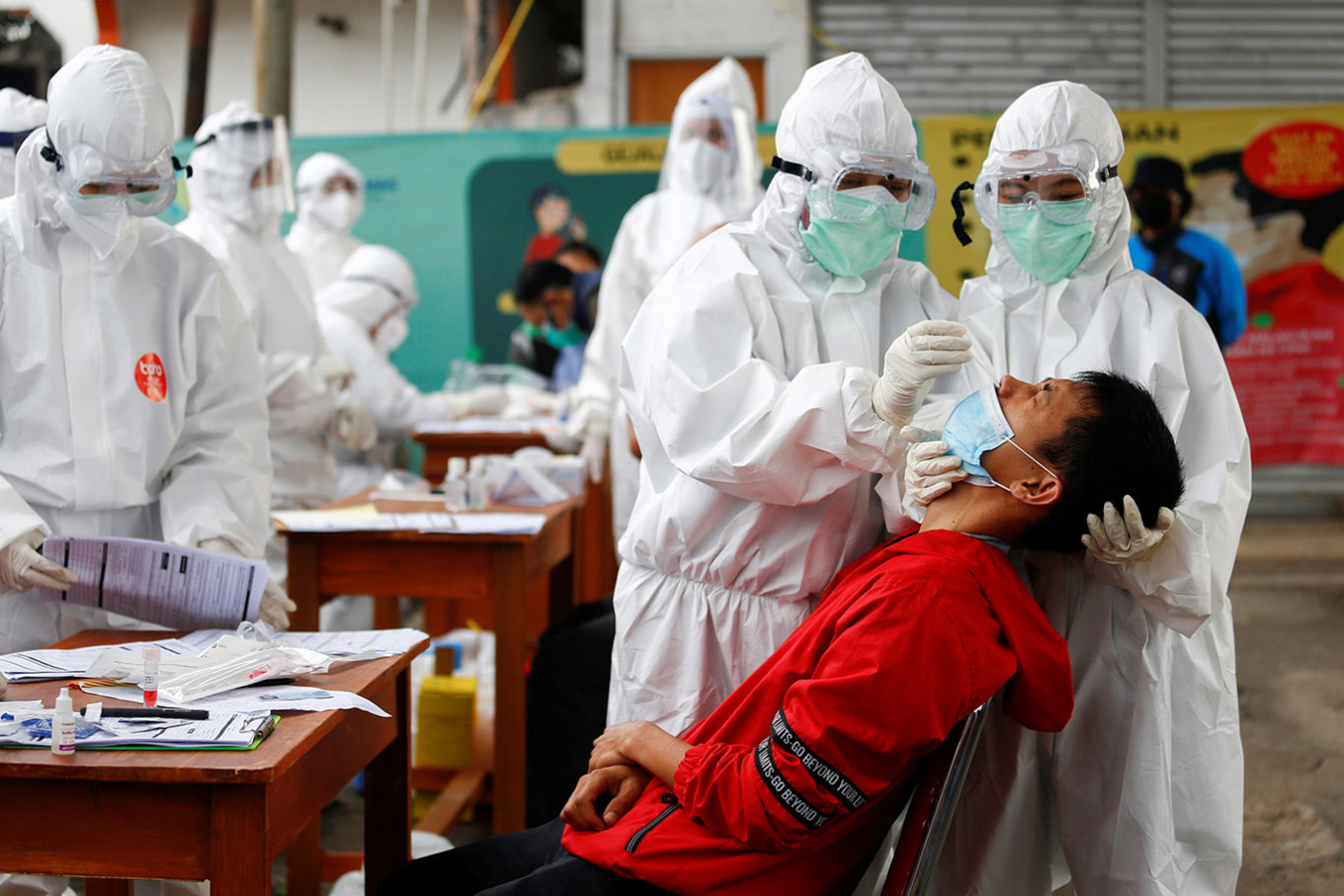Popular Reads
Top Results
Can't find what you're looking for?
View all search resultsPopular Reads
Top Results
Can't find what you're looking for?
View all search resultsCOVID-19 kills elderly, haunts the young in Indonesia
As Indonesia continues to report hundreds of new COVID-19 cases daily, the government appears to be preparing for the “new normal” by allowing people aged 44 years and below to work outside their homes despite mobility restrictions to contain the epidemic.
Change text size
Gift Premium Articles
to Anyone
As Indonesia continues to report hundreds of new COVID-19 cases daily, the government appears to be preparing for the “new normal” by allowing people aged 44 years and below to work outside their homes despite mobility restrictions to contain the epidemic.
COVID-19 task force head Doni Monardo triggered criticism after he said last week that the age group in question had a lower fatality rate at 15 percent and was less vulnerable than the elderly. Even so, State-Owned Enterprises (SOEs) Minister Erick Thohir issued a circular days later, setting out an example of a “new normal” scenario that entails a plan to allow SOE employees under 45 years of age to return to their offices starting on May 25, albeit with several precautions.
Data updated daily by the task force show that people aged 60 and above account for 44.2 percent of the deaths as of Sunday, followed by people aged between 46 and 59 years old at 39.8 percent, while those aged 45 and below make up the remaining 16 percent.
This is despite data on the distribution of cases showing that the 60-and-above age group only accounts for 16.2 percent of total infections, while the 46-to-59 group accounts for 28.7 percent and those aged 45 and below contribute the majority at 55.1 percent.
The task force said no clear age information was available for 9.3 percent of the infected patients.
The above figures do not include hundreds of fatalities among suspected patients reported by local administrations.
Soedarsono, the senior pulmonologist and the head of emerging and re-emerging infectious diseases at the COVID-19 referral hospital Dr. Soetomo in Surabaya, East Java, said fatalities were indeed more common among the elderly with comorbidity factors, but there had also been cases of young adults with such factors succumbing to the disease.
"Young patients aged between 30 and 40 years have died as well, mostly because of underlying health conditions. Young people without such conditions have a higher chance of recovering. The most common conditions are hypertension, heart disease and diabetes," he told The Jakarta Post on Saturday.
Read also: COVID-19: Govt to allow people under 45 to work outside to prevent more layoffs
Some patients with such conditions might develop complications, and treating these complications was often difficult even after they were cleared of the virus, Soedarsono said.
The task force's data collected from 585 patients show that half of them had underlying conditions, such as hypertension (52.9 percent), diabetes (33.8 percent) or heart disease (20.5 percent). Others include pulmonary and respiratory diseases, cancer, asthma, immune disorders, liver disease and tuberculosis.
Around 20.9 percent of the patients with hypertension died, while the death rate for those with diabetes is 15.9 percent, for those with heart disease is 10.1 percent and for those with other conditions in question is below 5 percent.
Noncommunicable diseases account for the largest burden on Indonesia's deficit-stricken National Health Insurance (JKN) -- being the cause of 66 percent of morbidity and mortality in 2015, up from about 37 percent in 1990, according to a 2016 World Bank report.
While the prevalence of the noncommunicable diseases is indeed higher among the elderly than other age groups, as shown by the 2018 Basic Health Survey (Riskesdas), a growing number of younger people are suffering from such diseases. They were at a heightened risk when exposed to the coronavirus, said epidemiologist Dicky Budiman.
The Riskesdas shows that the prevalence of hypertension in the 35-44 age group is 31.6 percent, in the 25-34 age group it is 20.1 percent and in the 18-24 age group it is 13.2 percent. The prevalence of diabetes and heart disease among the 35-44-year olds is 1.1 percent and 1.3 percent, respectively.
"The government's policy to allow people [below] 45 years to work should not apply generally to everyone in that age group. Not everyone in the age group will be safe [if infected]," Dicky said.
The stigma surrounding COVID-19, which was "almost worse than with HIV", coupled with inadequate testing, would likely affect how people sought help, forcing them to only show up at hospitals when it was already too late to treat them, he said.
Indonesia has seen 1,148 fatalities in less than three months since it recorded the first two confirmed cases in early March. The tally of confirmed cases rose to 17,514 nationwide on Sunday.
Pulmonologist Soedarsono said he believed there were many undetected cases, given the considerably high fatality rate. He cautioned against complacency among young people as even medical professionals still had much to learn about the new virus.
He said his teaching hospital was beginning to study possible blood clotting in COVID-19 patients, including in younger people, after studies in several countries found that some patients had developed dangerous blood clots.
"With COVID-19 patients, oftentimes there's incompatibility between patients' complaints and analyses of lungs, thorax or blood tests. This sometimes makes doctors wonder,” he said.










